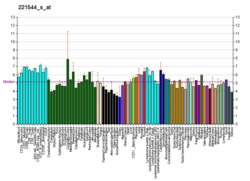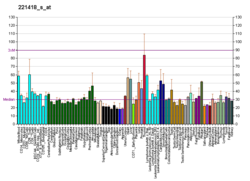MED16
Appearance
Mediator of RNA polymerase II transcription subunit 16 is an enzyme that in humans is encoded by the MED16 gene.[5][6][7]
Interactions
[edit]MED16 has been shown to interact with Thyroid hormone receptor alpha,[6] Estrogen receptor alpha[8] and Cyclin-dependent kinase 8.[6][8]
References
[edit]- ^ a b c ENSG00000175221 GRCh38: Ensembl release 89: ENSG00000282092, ENSG00000175221 – Ensembl, May 2017
- ^ a b c GRCm38: Ensembl release 89: ENSMUSG00000013833 – Ensembl, May 2017
- ^ "Human PubMed Reference:". National Center for Biotechnology Information, U.S. National Library of Medicine.
- ^ "Mouse PubMed Reference:". National Center for Biotechnology Information, U.S. National Library of Medicine.
- ^ Rachez C, Lemon BD, Suldan Z, Bromleigh V, Gamble M, Naar AM, Erdjument-Bromage H, Tempst P, Freedman LP (Jun 1999). "Ligand-dependent transcription activation by nuclear receptors requires the DRIP complex". Nature. 398 (6730): 824–8. Bibcode:1999Natur.398..824R. doi:10.1038/19783. PMID 10235266. S2CID 204992765.
- ^ a b c Ito M, Yuan CX, Malik S, Gu W, Fondell JD, Yamamura S, Fu ZY, Zhang X, Qin J, Roeder RG (Apr 1999). "Identity between TRAP and SMCC complexes indicates novel pathways for the function of nuclear receptors and diverse mammalian activators". Mol Cell. 3 (3): 361–70. doi:10.1016/S1097-2765(00)80463-3. PMID 10198638.
- ^ "Entrez Gene: THRAP5 thyroid hormone receptor associated protein 5".
- ^ a b Kang, Yun Kyoung; Guermah Mohamed; Yuan Chao-Xing; Roeder Robert G (Mar 2002). "The TRAP/Mediator coactivator complex interacts directly with estrogen receptors alpha and beta through the TRAP220 subunit and directly enhances estrogen receptor function in vitro". Proc. Natl. Acad. Sci. U.S.A. 99 (5). United States: 2642–7. Bibcode:2002PNAS...99.2642K. doi:10.1073/pnas.261715899. ISSN 0027-8424. PMC 122401. PMID 11867769.
Further reading
[edit]- Fondell JD, Ge H, Roeder RG (1996). "Ligand induction of a transcriptionally active thyroid hormone receptor coactivator complex". Proc. Natl. Acad. Sci. U.S.A. 93 (16): 8329–33. Bibcode:1996PNAS...93.8329F. doi:10.1073/pnas.93.16.8329. PMC 38670. PMID 8710870.
- Suzuki Y, Tsunoda T, Sese J, et al. (2001). "Identification and characterization of the potential promoter regions of 1031 kinds of human genes". Genome Res. 11 (5): 677–84. doi:10.1101/gr.gr-1640r. PMC 311086. PMID 11337467.
- Wang Q, Sharma D, Ren Y, Fondell JD (2003). "A coregulatory role for the TRAP-mediator complex in androgen receptor-mediated gene expression". J. Biol. Chem. 277 (45): 42852–8. doi:10.1074/jbc.M206061200. PMID 12218053.
- Strausberg RL, Feingold EA, Grouse LH, et al. (2003). "Generation and initial analysis of more than 15,000 full-length human and mouse cDNA sequences". Proc. Natl. Acad. Sci. U.S.A. 99 (26): 16899–903. Bibcode:2002PNAS...9916899M. doi:10.1073/pnas.242603899. PMC 139241. PMID 12477932.
- Sato S, Tomomori-Sato C, Banks CA, et al. (2004). "A mammalian homolog of Drosophila melanogaster transcriptional coactivator intersex is a subunit of the mammalian Mediator complex". J. Biol. Chem. 278 (50): 49671–4. doi:10.1074/jbc.C300444200. PMID 14576168.
- Wallberg AE, Yamamura S, Malik S, et al. (2004). "Coordination of p300-mediated chromatin remodeling and TRAP/mediator function through coactivator PGC-1alpha". Mol. Cell. 12 (5): 1137–49. doi:10.1016/S1097-2765(03)00391-5. PMID 14636573.
- Tomomori-Sato C, Sato S, Parmely TJ, et al. (2004). "A mammalian mediator subunit that shares properties with Saccharomyces cerevisiae mediator subunit Cse2". J. Biol. Chem. 279 (7): 5846–51. doi:10.1074/jbc.M312523200. PMID 14638676.
- Sato S, Tomomori-Sato C, Parmely TJ, et al. (2004). "A set of consensus mammalian mediator subunits identified by multidimensional protein identification technology". Mol. Cell. 14 (5): 685–91. doi:10.1016/j.molcel.2004.05.006. PMID 15175163.
- Gerhard DS, Wagner L, Feingold EA, et al. (2004). "The status, quality, and expansion of the NIH full-length cDNA project: the Mammalian Gene Collection (MGC)". Genome Res. 14 (10B): 2121–7. doi:10.1101/gr.2596504. PMC 528928. PMID 15489334.
External links
[edit]- MED16 human gene location in the UCSC Genome Browser.
- MED16 human gene details in the UCSC Genome Browser.







